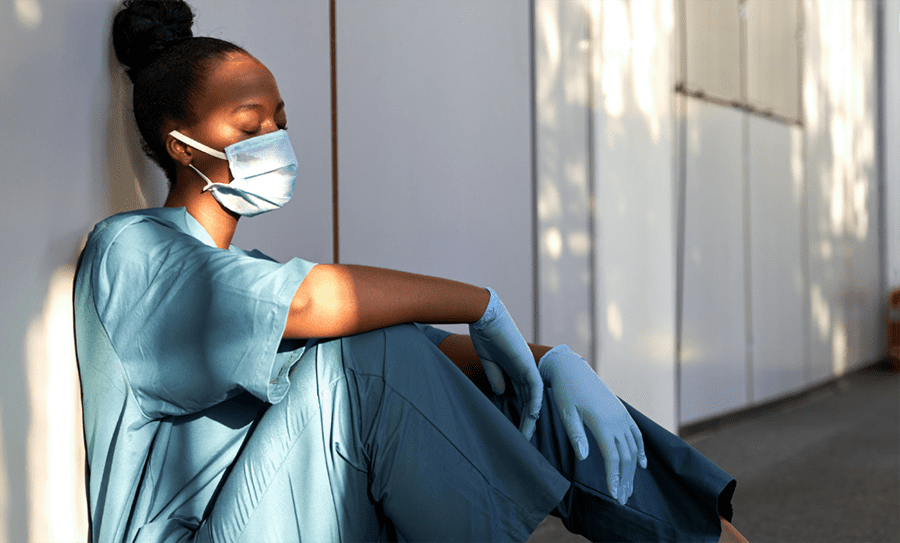Physician burnout has been a pressing topic for years, but as we enter the third year of the Covid-19 pandemic, how have things changed? How has Covid-19 impacted doctors?

Quick Review of Medscape’s 2021 Physician Burnout and Depression Report
To quickly review, Medscape’s data from the 2020 pandemic showed a drop in physician burnout rates in 2020, 42% compared to 44% in 2019. But that same data also showed a drop in happiness in 2020, from 69% to 49%.
The drop in burnout rates in 2020 was a reflection of what physicians believed to be their true calling: to perform as doctors and care for the sick. The drop in happiness was likely related to an incomplete fulfillment of Maslow’s hierarchy of their own personal needs in the time of the pandemic.
Review of Medscape’s 2022 Physician Burnout and Depression Report
Medscape’s 2022 Physician Burnout and Depression Report was released recently. In 2021, there was an increase in reported burnout: 47% compared to 42% last year. It should come as no surprise that within Emergency Medicine, 60% compared to 43% reported burnout. In Critical Care, physicians reported the highest burnout. Both male physicians, 41%, and female physicians, 56%, reported increased levels of burnout.
Many factors contributing to burnout have remained the same:
- bureaucratic tasks
- lack of respect from administrators and employers
- too many hours spent at work
- lack of control/autonomy
- insufficient compensation
- electronic medical records (EMR)
- Staffing shortages
Yet one more factor contributing to doctor burnout is an increasing lack of respect from patients, which grew to 20% vs. 17% in 2020. This caused physicians greater stress than the actual stress from treating Covid-19 patients (10%).
Physicians reporting the highest burnout are those working in outpatient clinics, 58% compared to 46% in 2020, and healthcare organizations and hospitals, 48% compared to 40% in 2020. As in the previous year, office-based solo practice physicians reported the least burnout of all the groups surveyed.
62% of physicians reported they had never suffered from depression prior to becoming a physician. Before Covid-19, 68% reported happy days and 18% reported unhappy days. During Covid-19, that number decreased to 47% reporting happy days and 36% reporting unhappy days in 2021.

Rates of Depression are Increasing Among Doctors
This alarming data feels like a lot to process. We can see during the Covid-19 pandemic, that both male and female physicians feel increasingly burned out and experience high stress and anxiety. Many sources of burnout, like bureaucratic tasks, lack of respect from administrators, too many hours spent working and EMR, have remained the same for years. Despite physicians putting their own health at risk to care for Covid-19 patients, there is also an increasing lack of respect from patients. Combined, these factors contribute to a heavy load for doctors to carry.
Burnout affects our lives and relationships. The majority of physicians do not have a history of mental health issues, yet overall, doctors are reporting decreased happiness and increased depression. So how are they coping with the additional stress?
Here are methods doctors report they use to deal with their burnout:
- Exercise: 48%
- Isolating from others: 45%
- Talking with family members and friends: 41%
- Sleep: 41%
I have written previously about the importance of Maslow’s hierarchy of needs in managing our own wellness as physicians and healers. Attention healthcare community: here’s a big red flag. Medscape reports while there is already a 120,000 physician shortage projected for 2030, 29% of the surveyed physicians (=14,400 physicians) plan to reduce work hours in order to manage burnout. This is a very serious problem.
Part of burnout recovery is understanding the difference between what can be changed and what cannot be changed. In this blog, I will not focus on the larger issues of bureaucratic tasks or lack of respect from administrators and EMR. These issues are largely out of the control of employed physicians. As noted above, self-employed solo practice physicians reported the least burnout. I do anticipate burnout increasing, and a shift towards solo practice as a way to fight burnout and exert change in one’s profession and work-life balance.
I instead would like to focus on the increase in the perceived lack of respect from patients. Rudeness towards physicians and healthcare staff should not be tolerated. Sadly, an increase in discourtesy seems to be happening throughout our culture as a whole.

Increased Violence Against Healthcare Workers is on the Rise
Violence against US health care workers has already been well-documented and has been increasing for at least a decade. According to US Bureau of Labor Statistics data, the incidence of violence-related health care worker injuries has increased by 67%, from 6.4 per 10, 000 full-time workers in 2011, to 10.7 per 10, 000 in 2018. Also in 2018, healthcare and social service workers were 5 times more likely to experience workplace violence than all workers, comprising a whopping 73% of all nonfatal workplace injuries and illnesses, requiring days away from work.
Other Industries Are Struggling With Similar Problems
“The world is short-staffed; please be kind to those who showed up,” signs flanked restaurant entrances during the pandemic. We are seeing a rising increase in discourtesy in general, and other industries have adapted methods to confront this. Adults who choose to not be kind and throw tantrums are quickly videotaped by citizen journalists keen to document and cancel the bad behavior. The Federal Aviation Authority reported 5981 unruly passenger incidents in 2021, of which 1075 are being investigated, compared to 183 investigations initiated in 2020. As a result, the FAA instituted a zero-tolerance policy with unruly passengers getting fined and placed on no-fly lists. The medical workplace community needs to address this issue as well.

My Methods of Handling Incivility
It seems that not only physicians are suffering, everyone is suffering. Hurt people hurt people, so a vicious cycle of gracelessness and rudeness gets perpetuated.
I am glad the FAA is taking a stand against bad behavior. Medical workplaces need to adopt similar zero-tolerance policies. Physicians have been thrown into a humanitarian and altruistic loophole where patient care had been prioritized over the health and safety of the physician, all under the label of patient health. Yes, physicians believe taking care of patients is our calling in life, but there is no calling at the expense of our own health and well-being too.
Certainly, I have encountered my share of rude patients. Being a female physician, I have encountered my share of “mansplaining” patients or family members. Sometimes this behavior is rooted in fear, but sometimes it is just someone with an unpleasant personality.
My younger self tolerated much of the verbal abuses, but my current self no longer has the bandwidth to do so. I have instituted my own zero-tolerance policy. I pledge to be polite and listen to my patients and practice good evidence-based medicine. As soon as someone starts getting rude, I acknowledge that they sound frustrated, angry, etc, and politely tell them they are being rude. Sometimes they calm down and we are able to complete the visit. Rarely have I offered to reschedule the appointment so the patient can calm down.

Closing Thoughts on the Current State of Physician Burnout
In this season of increased physician burnout, we must not forget the power we hold in our own hands. We can remind ourselves this: the last two years have been really hard on everyone. We can choose to not take things personally. We can choose to show empathy. We can choose to be kind to everyone. We can choose to not tolerate bad behavior in a way that is gracious and polite, and remain aligned with our mission as doctors to care for the sick.
Certainly, these tactics do not solve physicians’ issues with bureaucratic tasks and EMR, but the small things we can do help decrease burnout and unhappiness. As we continue navigating this crazy healthcare system, here is my final exhortation. Please stay strong, find what is in your power to change, and know that you are not alone.
Uzma Khan, MD, is a practicing Internist and a Woman in White Coats blog writer. She blogs about medicine, money, and life at Me and My Stethoscope, and she can be found on Facebook Uzma Khan, MD, Instagram @uzmakhanmd and Twitter @uzmakhanmd.
Are you a physician who feels unsupported and is thinking of quitting or going part-time? Or unconsciously turning to chocolate, wine or Netflix to numb out at the end of the day? We want to invite you to Burn Bright instead of Burn Out with our Physician Wellness and Empowerment Program? Join us now to alleviate the chronic stress so you have the breathing room to create a life you love and never experience burnout again.
If you are ready to say goodbye to impostor syndrome and welcome confidence and balance into your life, join our free training where we cover 3 steps to help you kick overwhelm and exhaustion to the curb and live that confident and balanced life you deserve. Click here to enroll in our free training.



